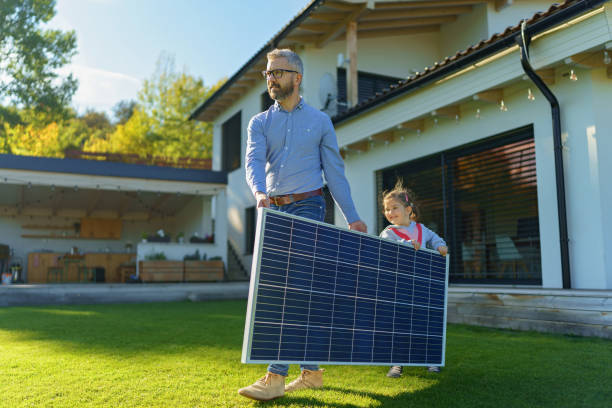If you’re considering installing solar power for your home or business to offset both your environmental impact and power bill. Our comprehensive guide on the advantages and disadvantages of solar panel can assist you in determining whether or not it will be a viable and sustainable option for you.
What is solar energy?
Solar energy is a type of renewable energy that is harnessed from the radiation of the sun. It is harnessed using solar panels or photovoltaic cells that convert sunlight into electricity. Solar energy is considered an environmentally friendly and sustainable energy source. Because it does not emit greenhouse gases and does not require the burning of fossil fuels to generate electricity. It can be used for various applications, including powering homes and businesses, heating water, and providing electricity to remote areas.
So what is Solar Panel?

A solar panel, or a photovoltaic (PV) module or PV panel, is a rectangular assembly of solar cells mounted in a frame. It aims to capture sunlight as a radiant energy source and convert it into direct current (DC) electricity. When multiple solar panels are neatly organized, it is called a photovoltaic system or solar array. Such arrays can generate solar electricity that can be used to electrical power equipment directly or fed back into an alternate current (AC) grid via an inverter system.
History of solar panel
Solar panels have a history that dates back to 1839, when French physicist Edmond Becquerel first observed the photovoltaic effect. The modern solar panel design was developed in 1939 by Russell Ohl, and in 1954 Bell Labs used Ohl’s design to create the first commercially viable silicon solar cell.
The first commercial solar panel was created in 1881 by American inventor Charles Fritts, but it could have been more efficient compared to coal fired power plants. Solar panel installers saw significant growth between 2008 and 2013, leading to the development of solutions like micro inverters and power optimizers to overcome installation challenges.
Today, solar energy is a widely accepted and popular form of renewable energy used in homes and businesses worldwide.
Advantages of Solar energy
Renewable and helps reduce carbon emissions.
Solar energy is a clean and renewable source that produces no carbon emissions or other greenhouse gases. Additionally, solar energy systems don’t require mining or drilling for fuel, which reduces environmental damage. Unlike traditional power plants, solar energy systems use little to no water.
It can lower your home’s electricity bill.
Installing a solar energy system in your home can reduce your dependence on the grid, saving your electricity bill. Homeowners with solar energy systems may even produce excess electricity to sell to the utility, resulting in financial benefits.
Climate-Proof Electricity Production
Solar energy systems can generate electricity in any climate, although cloudy days may temporarily reduce electricity production. However, cold weather does not impact productivity. Snowfall can benefit solar systems by cleaning the panels and increasing the light hitting them, producing more electricity.
You can earn money through Solar Renewable Energy Credits.
Some states offer solar renewable energy certificates (SRECs) representing a megawatt-hour of solar-generated electricity. Electricity suppliers purchase these certificates to fulfill their state’s Renewable Portfolio Standard. Which requires a certain amount of their renewable energy to come from solar. Homeowners can earn money from their solar investment by selling SRECs for their system’s output.
Low maintenance costs.
Maintaining solar panels is relatively simple as they do not have any moving parts that can wear out over time. Regular cleaning and ensuring they are in good physical condition are the key ways to keep them working efficiently. With a lifespan of approximately 25 years and low maintenance costs, solar panels can provide a good return on investment.
Drawbacks
Rely on sunlight
When using solar energy, a system needs sunlight to produce power. Customers in regions with less-than-ideal levels of sun exposure or inclement weather may find this a problem. This problem can be reduced by using solar batteries to store excess energy. The greatest solar panels will continue to be affordable and effective enough to be place even in the presence of persistent clouds.
Challenging Installation Process
While installing solar panels involves simple components, the process can still be complicate, particularly for those comfortable working with electricity or on a roof. For example, connecting the panel wiring to the home can be intricate and may require the expertise of professionals to ensure safe and effective installation.
Limited Space Availability
One of the significant drawbacks of solar energy is that solar panels and the associated wiring require ample space for installation. Depending on the number of solar panels needed, finding sufficient space with proper exposure can be challenging, particularly in densely populated residential areas with limited space.
Costly Energy Storage
While energy storage is essential for a solar panel system, it can be a significant investment. The cost of solar batteries depends on the type and size of the battery. For example, a single lead-acid battery can range from $200 to $800. At the same time, a residential lithium-ion solar system can cost between $7,000 to $14,000, which may be a significant expense for some homeowners.
Faqs
What number of solar panels would it take to power a house?
An average home typically requires between 17 and 21 solar panels to offset utility bills with solar power fully. However, the specific number of panels needed varies depending on geographic location and individual specifications. Therefore, it is crucial to consider these factors to determine the appropriate number of solar panels required to meet your home’s energy needs.
Which solar panel is the best?
When selecting the best solar panel, monocrystalline (mono) panels are a popular choice. Although they are the most expensive option, they offer significant long-term benefits. Monocrystalline solar panels are widely available and are consider the most efficient, durable, and long lasting technology available in the market. Therefore, while they may be more expensive initially, the high quality and long-term benefits make them the best choice for solar panel installations.
What is the maximum Wattage of Solar Panels?
Currently, the highest wattage solar panels available for residential use are around 500W, which is more than sufficient for most household applications. These panels are highly efficient and capable of generating significant power, making them a popular choice for residential installations. With their high wattage and energy output, these solar panels can effectively meet the energy demands of a typical household, making them an ideal choice for home owners who want to reduce their dependence on the traditional power grid.
Do solar panels work in the rain?
Solar panels can still operate in the rain but may not produce as much energy as on sunny days. Solar panels can still produce at least 30 to 50% of their maximum power when it’s cloudy and only 10 to 20% when it’s heavily raining. For people who only use solar energy, solar batteries can store excess energy for backup power during cloudy days.
What is the typical lifespan of solar panels?
A solar power module’s operational lifetime is normally between 30 and 35 years, while some systems can survive even longer. Because of this, even though only some solar panels are being discard, more systems will eventually outlive their usefulness.
Conclusion
Solar panels have become an increasingly popular and viable source of renewable energy. While there are some drawbacks, such as high installation costs and space constraints, the benefits of solar energy, including environmental sustainability and long-term cost savings, make it a valuable investment for homeowners and businesses. As technology continues to improve and costs decrease, solar energy has the potential to become an even more significant contributor to the global energy mix.



